当代英国概况知识要点
- 格式:doc
- 大小:133.50 KB
- 文档页数:19
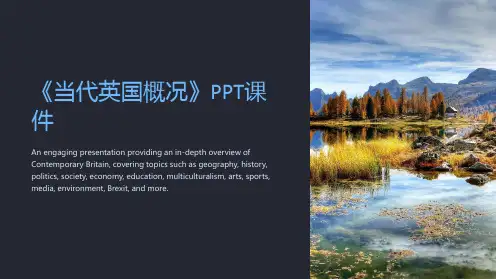
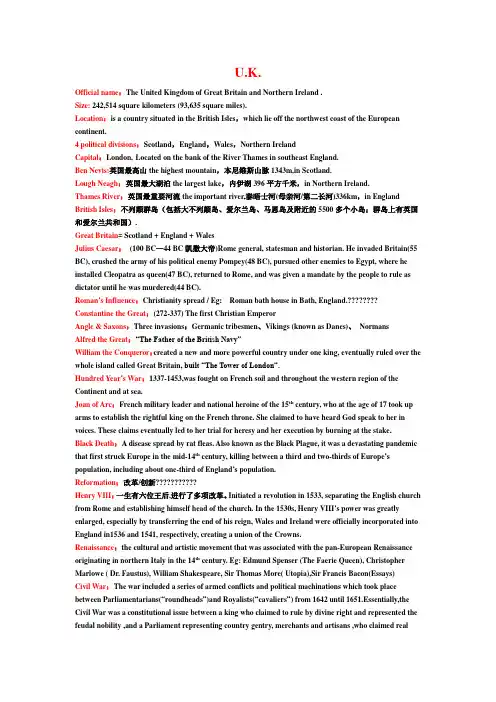
U.K.Official name:The United Kingdom of Great Britain and Northern Ireland .Size: 242,514 square kilometers (93,635 square miles).Location:is a country situated in the British Isles,which lie off the northwest coast of the European continent.4 political divisions:Scotland,England,Wales,Northern IrelandCapital:London,Located on the bank of the River Thames in southeast England.Ben Nevis:英国最高山the highest mountain,本尼维斯山脉1343m,in Scotland.Lough Neagh:英国最大湖泊the largest lake,内伊湖396平方千米,in Northern Ireland.Thames River:英国最重要河流the important river,泰晤士河(母亲河/第二长河)336km,in England British Isles:不列颠群岛(包括大不列颠岛、爱尔兰岛、马恩岛及附近的5500多个小岛;群岛上有英国和爱尔兰共和国).Great Britain= Scotland + England + WalesJulius Caesar:(100 BC—44 BC凯撒大帝)Rome general, statesman and historian. He invaded Britain(55 BC), crushed the army of his political enemy Pompey(48 BC), pursued other enemies to Egypt, where he installed Cleopatra as queen(47 BC), returned to Rome, and was given a mandate by the people to rule as dictator until he was murdered(44 BC).Roman’s Influence:Christianity spread / Eg:Roman bath house in Bath, England.???????? Constantine the Great:(272-337) The first Christian EmperorAngle & Saxons:Three invasions:Germanic tribesmen、Vikings (known as Danes)、NormansAlfred the Great:“The Father of the British Navy”William the Conqueror:created a new and more powerful country under one king, eventually ruled over the whole island called Great Britain, built “The Tower of London”.Hundred Year’s War:1337-1453,was fought on French soil and throughout the western region of the Continent and at sea.Joan of Arc:French military leader and national heroine of the 15th century, who at the age of 17 took up arms to establish the rightful king on the French throne. She claimed to have heard God speak to her in voices. These claims eventually led to her trial for heresy and her execution by burning at the stake.Black Death:A disease spread by rat fleas. Also known as the Black Plague, it was a devastating pandemic that first struck Europe in the mid-14th century, killing between a third and two-thirds of Europe’s population, including about one-third of England’s population.Reformation:改革/创新???????????Henry VIII:一生有六位王后,进行了多项改革。
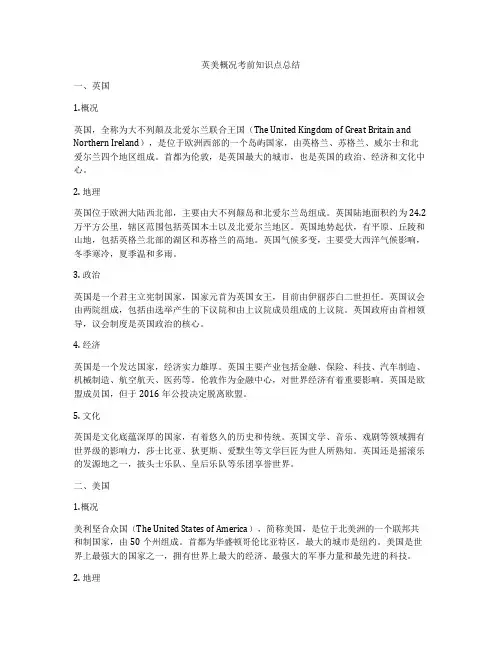
英美概况考前知识点总结一、英国1.概况英国,全称为大不列颠及北爱尔兰联合王国(The United Kingdom of Great Britain and Northern Ireland),是位于欧洲西部的一个岛屿国家,由英格兰、苏格兰、威尔士和北爱尔兰四个地区组成。
首都为伦敦,是英国最大的城市,也是英国的政治、经济和文化中心。
2. 地理英国位于欧洲大陆西北部,主要由大不列颠岛和北爱尔兰岛组成。
英国陆地面积约为24.2万平方公里,辖区范围包括英国本土以及北爱尔兰地区。
英国地势起伏,有平原、丘陵和山地,包括英格兰北部的湖区和苏格兰的高地。
英国气候多变,主要受大西洋气候影响,冬季寒冷,夏季温和多雨。
3. 政治英国是一个君主立宪制国家,国家元首为英国女王,目前由伊丽莎白二世担任。
英国议会由两院组成,包括由选举产生的下议院和由上议院成员组成的上议院。
英国政府由首相领导,议会制度是英国政治的核心。
4. 经济英国是一个发达国家,经济实力雄厚。
英国主要产业包括金融、保险、科技、汽车制造、机械制造、航空航天、医药等。
伦敦作为金融中心,对世界经济有着重要影响。
英国是欧盟成员国,但于2016年公投决定脱离欧盟。
5. 文化英国是文化底蕴深厚的国家,有着悠久的历史和传统。
英国文学、音乐、戏剧等领域拥有世界级的影响力,莎士比亚、狄更斯、爱默生等文学巨匠为世人所熟知。
英国还是摇滚乐的发源地之一,披头士乐队、皇后乐队等乐团享誉世界。
二、美国1.概况美利坚合众国(The United States of America),简称美国,是位于北美洲的一个联邦共和制国家,由50个州组成。
首都为华盛顿哥伦比亚特区,最大的城市是纽约。
美国是世界上最强大的国家之一,拥有世界上最大的经济、最强大的军事力量和最先进的科技。
2. 地理美国地处北美洲中部,东临大西洋,西临太平洋,北界加拿大,南濒墨西哥湾。
美国领土面积约为9.83万万平方公里,是世界第四大国家。
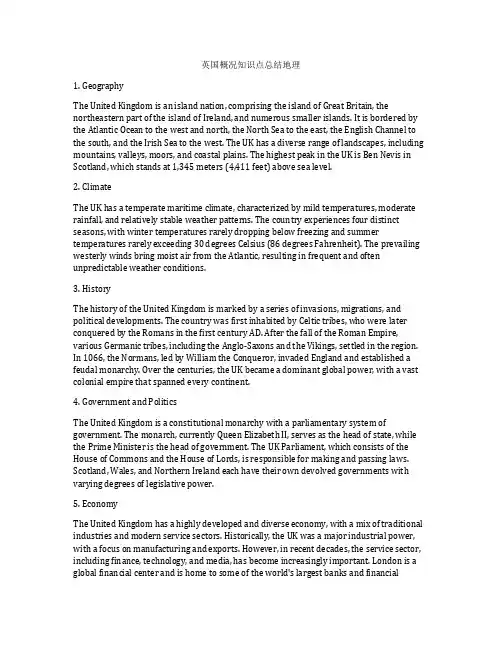
英国概况知识点总结地理1. GeographyThe United Kingdom is an island nation, comprising the island of Great Britain, the northeastern part of the island of Ireland, and numerous smaller islands. It is bordered by the Atlantic Ocean to the west and north, the North Sea to the east, the English Channel to the south, and the Irish Sea to the west. The UK has a diverse range of landscapes, including mountains, valleys, moors, and coastal plains. The highest peak in the UK is Ben Nevis in Scotland, which stands at 1,345 meters (4,411 feet) above sea level.2. ClimateThe UK has a temperate maritime climate, characterized by mild temperatures, moderate rainfall, and relatively stable weather patterns. The country experiences four distinct seasons, with winter temperatures rarely dropping below freezing and summer temperatures rarely exceeding 30 degrees Celsius (86 degrees Fahrenheit). The prevailing westerly winds bring moist air from the Atlantic, resulting in frequent and often unpredictable weather conditions.3. HistoryThe history of the United Kingdom is marked by a series of invasions, migrations, and political developments. The country was first inhabited by Celtic tribes, who were later conquered by the Romans in the first century AD. After the fall of the Roman Empire, various Germanic tribes, including the Anglo-Saxons and the Vikings, settled in the region. In 1066, the Normans, led by William the Conqueror, invaded England and established a feudal monarchy. Over the centuries, the UK became a dominant global power, with a vast colonial empire that spanned every continent.4. Government and PoliticsThe United Kingdom is a constitutional monarchy with a parliamentary system of government. The monarch, currently Queen Elizabeth II, serves as the head of state, while the Prime Minister is the head of government. The UK Parliament, which consists of the House of Commons and the House of Lords, is responsible for making and passing laws. Scotland, Wales, and Northern Ireland each have their own devolved governments with varying degrees of legislative power.5. EconomyThe United Kingdom has a highly developed and diverse economy, with a mix of traditional industries and modern service sectors. Historically, the UK was a major industrial power, with a focus on manufacturing and exports. However, in recent decades, the service sector, including finance, technology, and media, has become increasingly important. London is a global financial center and is home to some of the world's largest banks and financialinstitutions. The UK is also a member of the European Union, which has a significant impact on its economy and trade relationships.6. CultureThe United Kingdom has a rich and diverse cultural heritage, encompassing literature, music, art, theater, and film. The country has produced numerous influential writers, including William Shakespeare, Charles Dickens, and Jane Austen. The UK is also known for its contributions to popular music, with bands and artists such as The Beatles, The Rolling Stones, and Adele achieving international acclaim. British theater and film have also made significant contributions to the global arts scene, with the West End and Hollywood being recognized as major hubs for entertainment.7. EducationThe United Kingdom is home to some of the world's most prestigious educational institutions, including the universities of Oxford and Cambridge. The country has a long-standing tradition of academic excellence and is a popular destination for international students seeking high-quality education. The UK education system is known for its rigorous standards and emphasis on critical thinking, research, and innovation.8. HealthcareThe United Kingdom has a publicly funded healthcare system known as the National Health Service (NHS). The NHS provides free or subsidized healthcare to all UK residents, funded through taxes and government allocations. The system is widely regarded as one of the most comprehensive and effective in the world, providing a range of medical services, including general practice, hospital care, and specialist treatments.9. TourismThe United Kingdom is a popular tourist destination, attracting millions of visitors each year. The country is known for its rich history, diverse landscapes, and cultural attractions. Tourists can explore iconic landmarks such as the Tower of London, Buckingham Palace, and Edinburgh Castle, as well as natural wonders like the Lake District and the Scottish Highlands. The UK also offers a wide range of cultural events, festivals, and culinary experiences for visitors to enjoy.In conclusion, the United Kingdom is a dynamic and influential country with a long and storied history. Its geography, climate, government, economy, culture, education, healthcare, and tourism all contribute to its unique identity and global significance. As a leading player on the world stage, the UK continues to shape and influence global developments in a wide range of areas.。
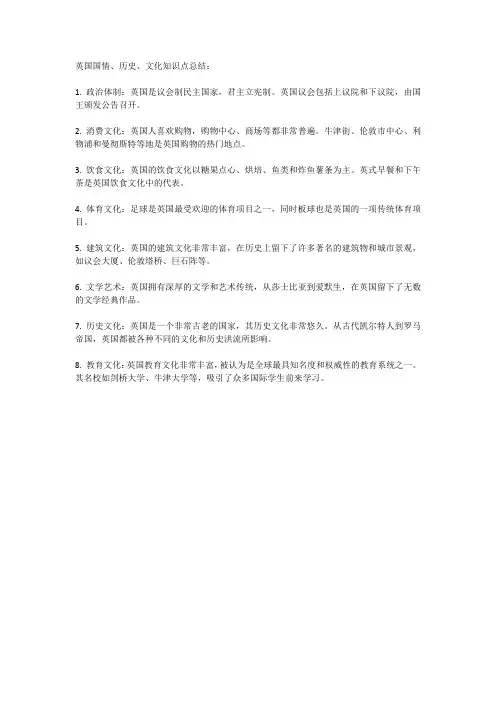
英国国情、历史、文化知识点总结:
1. 政治体制:英国是议会制民主国家,君主立宪制。
英国议会包括上议院和下议院,由国王颁发公告召开。
2. 消费文化:英国人喜欢购物,购物中心、商场等都非常普遍。
牛津街、伦敦市中心、利物浦和曼彻斯特等地是英国购物的热门地点。
3. 饮食文化:英国的饮食文化以糖果点心、烘培、鱼类和炸鱼薯条为主。
英式早餐和下午茶是英国饮食文化中的代表。
4. 体育文化:足球是英国最受欢迎的体育项目之一,同时板球也是英国的一项传统体育项目。
5. 建筑文化:英国的建筑文化非常丰富,在历史上留下了许多著名的建筑物和城市景观,如议会大厦、伦敦塔桥、巨石阵等。
6. 文学艺术:英国拥有深厚的文学和艺术传统,从莎士比亚到爱默生,在英国留下了无数的文学经典作品。
7. 历史文化:英国是一个非常古老的国家,其历史文化非常悠久。
从古代凯尔特人到罗马帝国,英国都被各种不同的文化和历史洪流所影响。
8. 教育文化:英国教育文化非常丰富,被认为是全球最具知名度和权威性的教育系统之一。
其名校如剑桥大学、牛津大学等,吸引了众多国际学生前来学习。
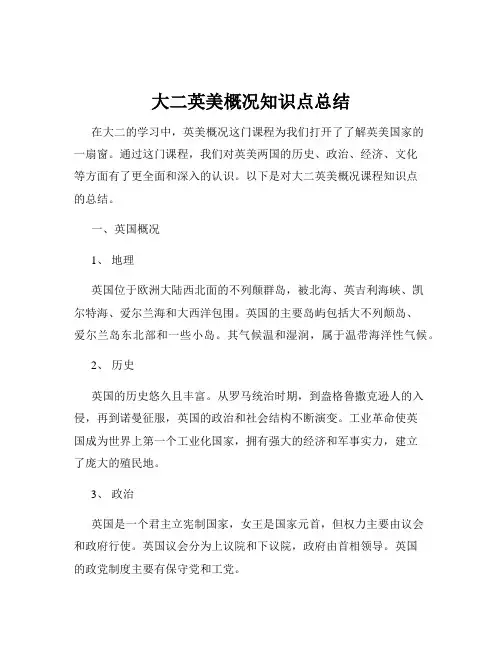
大二英美概况知识点总结在大二的学习中,英美概况这门课程为我们打开了了解英美国家的一扇窗。
通过这门课程,我们对英美两国的历史、政治、经济、文化等方面有了更全面和深入的认识。
以下是对大二英美概况课程知识点的总结。
一、英国概况1、地理英国位于欧洲大陆西北面的不列颠群岛,被北海、英吉利海峡、凯尔特海、爱尔兰海和大西洋包围。
英国的主要岛屿包括大不列颠岛、爱尔兰岛东北部和一些小岛。
其气候温和湿润,属于温带海洋性气候。
2、历史英国的历史悠久且丰富。
从罗马统治时期,到盎格鲁撒克逊人的入侵,再到诺曼征服,英国的政治和社会结构不断演变。
工业革命使英国成为世界上第一个工业化国家,拥有强大的经济和军事实力,建立了庞大的殖民地。
3、政治英国是一个君主立宪制国家,女王是国家元首,但权力主要由议会和政府行使。
英国议会分为上议院和下议院,政府由首相领导。
英国的政党制度主要有保守党和工党。
4、经济英国是世界上重要的经济体之一,其经济以服务业为主,特别是金融服务业。
伦敦是全球重要的金融中心之一。
制造业和农业在英国经济中也占有一定地位。
5、文化英国文化底蕴深厚,在文学、艺术、音乐、戏剧等领域有着卓越的成就。
从莎士比亚的戏剧到简·奥斯汀的小说,从披头士乐队到皇家芭蕾舞团,英国的文化影响力广泛。
此外,英国的教育体系也备受世界瞩目,拥有众多顶尖的大学。
二、美国概况1、地理美国位于北美洲中部,领土还包括北美洲西北部的阿拉斯加和太平洋中部的夏威夷群岛。
美国地形多样,有山脉、平原、高原和沙漠等。
气候类型丰富,从寒带到热带都有分布。
2、历史美国原为印第安人的聚居地,15 世纪末,西班牙、荷兰、法国、英国等相继移民至此。
通过独立战争,美国摆脱了英国的殖民统治,建立了联邦制国家。
美国在 19 世纪通过领土扩张和工业发展迅速崛起,成为世界强国。
3、政治美国是一个联邦制国家,实行三权分立的政治制度,行政权由总统行使,立法权属于国会,司法权属于最高法院。
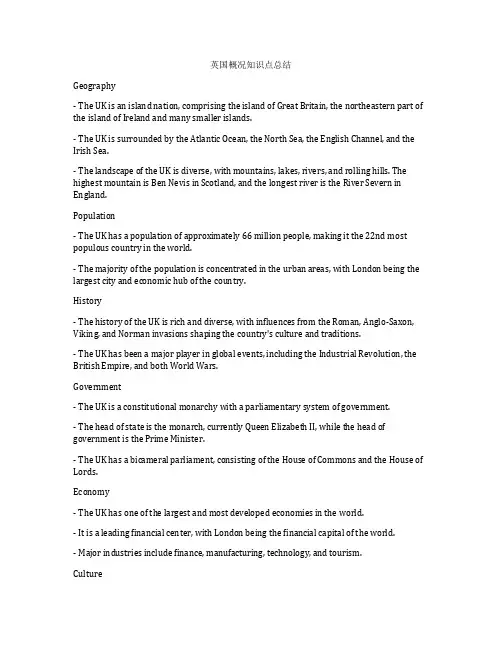
英国概况知识点总结Geography- The UK is an island nation, comprising the island of Great Britain, the northeastern part of the island of Ireland and many smaller islands.- The UK is surrounded by the Atlantic Ocean, the North Sea, the English Channel, and the Irish Sea.- The landscape of the UK is diverse, with mountains, lakes, rivers, and rolling hills. The highest mountain is Ben Nevis in Scotland, and the longest river is the River Severn in England.Population- The UK has a population of approximately 66 million people, making it the 22nd most populous country in the world.- The majority of the population is concentrated in the urban areas, with London being the largest city and economic hub of the country.History- The history of the UK is rich and diverse, with influences from the Roman, Anglo-Saxon, Viking, and Norman invasions shaping the country's culture and traditions.- The UK has been a major player in global events, including the Industrial Revolution, the British Empire, and both World Wars.Government- The UK is a constitutional monarchy with a parliamentary system of government.- The head of state is the monarch, currently Queen Elizabeth II, while the head of government is the Prime Minister.- The UK has a bicameral parliament, consisting of the House of Commons and the House of Lords.Economy- The UK has one of the largest and most developed economies in the world.- It is a leading financial center, with London being the financial capital of the world.- Major industries include finance, manufacturing, technology, and tourism.Culture- The UK has a rich cultural heritage, with a diverse mix of traditions, customs, and art forms. - It has been home to prominent writers, musicians, artists, and scientists, including William Shakespeare, the Beatles, and Isaac Newton.- The UK is known for its iconic landmarks, such as the Big Ben, Buckingham Palace, and Stonehenge.Education- The UK has a well-established education system, with a strong emphasis on academic excellence and research.- It is home to some of the world's top universities, including Oxford and Cambridge. Language- The official language of the UK is English, but there are also regional languages such as Welsh and Scottish Gaelic.Religion- The UK is a predominantly Christian country, with the Church of England being the established church.- It is also home to various religious communities, including Muslims, Hindus, Sikhs, and Jews.Transportation- The UK has a well-developed transportation network, including an extensive road and rail system.- It is also home to several major airports, including Heathrow and Gatwick.Healthcare- The UK has a national healthcare system, known as the National Health Service (NHS), which provides free healthcare to all residents.Sports- The UK has a strong sporting culture, with popular sports including football, rugby, cricket, and tennis.- It has hosted major sporting events, such as the Olympics and the FIFA World Cup.These are just a few of the key points about the United Kingdom. Its rich history, diverse culture, and strong economy make it a fascinating and influential country on the global stage.。

英美概况教程知识点总结英国和美国是世界上最具影响力、最发达的国家之一,两国在政治、经济、文化、教育等方面都具有举足轻重的地位。
了解英美的概况对于拓展视野、增进知识十分重要。
本文将对英美概况进行详细总结,希望能为读者提供全面的了解。
一、英国概况1. 地理位置英国位于欧洲西部,东临英吉利海峡,北面是北海,西北面是爱尔兰海,东北面是北大西洋。
英国主要由大不列颠岛和苏格兰、威尔士、北爱尔兰等岛屿组成。
2. 政治体制英国是一个君主立宪制国家,国家元首是女王伊丽莎白二世,首相则是政府首脑。
3. 经济发展英国是世界第五大经济体,金融、汽车制造、航空航天、化工、制药等产业发达,是全球最大的外汇交易中心。
4. 文化英国是世界文化强国,文学、音乐、艺术、体育等方面都有深厚的底蕴,如莎士比亚、贝多芬、莫扎特等都是国际知名的文化巨匠。
二、美国概况1. 地理位置美国位于北美洲的中心地带,东临大西洋,西濒太平洋,北面和加拿大相邻,南面与墨西哥相接。
2. 政治体制美国是一个联邦制国家,国家元首是总统,实行三权分立的政治体制。
3. 经济发展美国是世界第一大经济体,工业、农业、科技、金融等方面都处于世界领先地位,是全球最大的出口国和进口国。
4. 文化美国是世界文化强国,好莱坞电影、流行音乐、时尚等文化产业对全球产生深远影响,美国文艺活动也具有世界性影响力。
三、英美概况对比1. 政治体制英国是君主立宪制国家,国家元首是女王,政治体制稳定;美国是联邦制国家,国家元首是总统,实行三权分立的政治体制。
2. 经济发展英国虽然是世界经济体,但经济规模和实力与美国相比仍有差距,尤其在科技、金融等方面美国更为发达。
3. 文化影响英国和美国在文化领域都有世界性的影响力,但美国的文化产业更加发达,对全球的影响力更广泛。
四、学习英美概况的重要性1. 拓展视野了解英美的概况可以帮助人们拓展视野,了解世界上其他国家的政治、经济、文化等情况,增强对世界的认识。
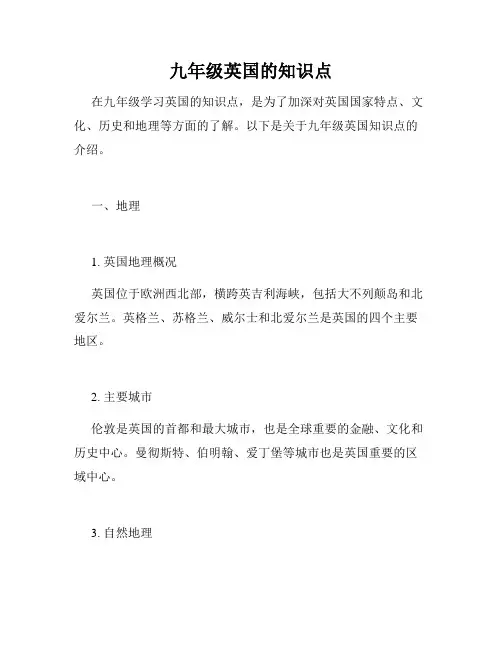
九年级英国的知识点在九年级学习英国的知识点,是为了加深对英国国家特点、文化、历史和地理等方面的了解。
以下是关于九年级英国知识点的介绍。
一、地理1. 英国地理概况英国位于欧洲西北部,横跨英吉利海峡,包括大不列颠岛和北爱尔兰。
英格兰、苏格兰、威尔士和北爱尔兰是英国的四个主要地区。
2. 主要城市伦敦是英国的首都和最大城市,也是全球重要的金融、文化和历史中心。
曼彻斯特、伯明翰、爱丁堡等城市也是英国重要的区域中心。
3. 自然地理英国地形多样,包括山脉、高原、平原和海岸线。
最著名的山脉是苏格兰的高地和威尔士的雪山。
而英格兰东部则以平原为主。
二、历史1. 古代历史英国在古代受到罗马帝国的统治,随后发展为盎格鲁-撒克逊王国,并于1066年被诺曼底公爵征服,建立了诺曼底王朝。
中世纪的英格兰发展出了独特的封建制度。
2. 后期历史英国在16世纪和17世纪经历了宗教改革和文艺复兴,逐渐成为一个繁荣的海上帝国。
英国工业革命的发生使其成为世界上第一个工业化国家。
3. 英国帝国时期18世纪末到20世纪初,英国建立了广泛的殖民地帝国,包括加拿大、印度、澳大利亚等地。
这些殖民地对英国的发展产生了深远影响。
三、文化1. 英国文学英国文学有着悠久的历史和世界影响力。
莎士比亚、狄更斯、奥斯丁等作家的作品是英国文学的代表。
英国也培养了众多诺贝尔文学奖得主。
2. 英国音乐英国以其丰富多样的音乐风格而闻名,包括古典音乐、摇滚乐和流行音乐。
披头士乐队、皇后乐队和滚石乐队等英国乐队享有全球声誉。
3. 英国传统节日英国拥有丰富多样的传统节日,如圣诞节、复活节、万圣节等。
每年的皇后诞辰庆典也是英国重要的庆典之一。
四、政治制度1. 君主立宪制英国是一个君主立宪制国家,国家元首是君主,目前是女王伊丽莎白二世。
议会是英国的立法机构,包括上议院和下议院。
2. 政党制度英国政治体系是多党制,保守党和工党是两大主要政党。
每个政党都有自己的党领袖,通过选举产生国家的领导人。

英国的发展知识点总结英国是一个历史悠久、文化灿烂的国家。
在过去的几个世纪里,英国经历了许多风雨,但它始终是世界上最具影响力的国家之一。
英国发展的知识点涉及政治、经济、社会、文化等方面,下面我们将逐一进行总结。
一、政治1. 英国的政治体系英国是一个君主立宪制国家,国家元首是英国君主。
英国的政治体系基于议会制度,议会由两个议院组成:上议院和下议院。
上议院是贵族院,下议院是民选议会。
英国的首相是由下议院多数党的党魁担任,是政府的首脑。
2. 英国的政党制度英国主要的政党有保守党、工党和自由民主党。
保守党一直是英国政治上的重要力量,工党也具有相当的影响力。
两党轮流执政,自由民主党在某些地方也有一定的选民支持。
3. 英国的殖民主义英国曾经是世界上最大的殖民帝国之一。
它曾经殖民了美洲、非洲、亚洲和大洋洲的大部分地区。
殖民主义对英国政治、经济和社会发展产生了深远的影响,也是英国政治历史上的重要组成部分。
4. 英国的政治改革英国进行过一系列的政治改革,其中最重要的是1832年通过的《大选法案》。
该法案取消了一些地方的选区,增加了其他地方的代表人数,使英国政治更加民主化和公平。
二、经济1. 英国的工业革命英国是世界上第一个工业化国家,18世纪末19世纪初发生了著名的工业革命。
工业革命使英国成为全球最大的经济实体之一,也给世界经济带来了深远的影响。
2. 英国的金融体系伦敦是世界金融中心之一,英国拥有完善的金融体系和银行业。
英国的金融服务业对全球经济产生了重大作用,是英国经济一个重要支柱。
3. 英国的贸易英国是一个贸易大国,尤其是在其殖民时期。
直到现在,英国仍然是一个重要的贸易国家,贸易额在全球经济中占有较大份额。
4. 英国的经济改革英国进行过一系列的经济改革,从撒切尔夫人的私有化政策到布莱尔时代的劳动力市场改革,都对英国经济产生了深远的影响。
三、社会1. 英国的社会福利制度英国有比较完善的社会福利制度,包括医疗保健、教育、住房等。
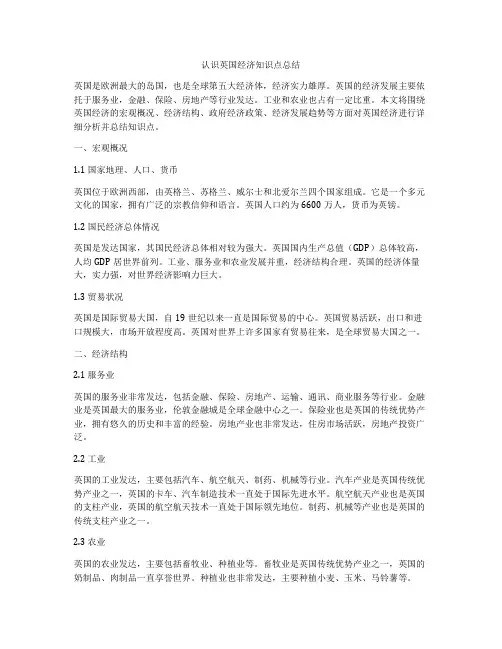
认识英国经济知识点总结英国是欧洲最大的岛国,也是全球第五大经济体,经济实力雄厚。
英国的经济发展主要依托于服务业,金融、保险、房地产等行业发达。
工业和农业也占有一定比重。
本文将围绕英国经济的宏观概况、经济结构、政府经济政策、经济发展趋势等方面对英国经济进行详细分析并总结知识点。
一、宏观概况1.1 国家地理、人口、货币英国位于欧洲西部,由英格兰、苏格兰、威尔士和北爱尔兰四个国家组成。
它是一个多元文化的国家,拥有广泛的宗教信仰和语言。
英国人口约为6600万人,货币为英镑。
1.2 国民经济总体情况英国是发达国家,其国民经济总体相对较为强大。
英国国内生产总值(GDP)总体较高,人均GDP居世界前列。
工业、服务业和农业发展并重,经济结构合理。
英国的经济体量大,实力强,对世界经济影响力巨大。
1.3 贸易状况英国是国际贸易大国,自19世纪以来一直是国际贸易的中心。
英国贸易活跃,出口和进口规模大,市场开放程度高。
英国对世界上许多国家有贸易往来,是全球贸易大国之一。
二、经济结构2.1 服务业英国的服务业非常发达,包括金融、保险、房地产、运输、通讯、商业服务等行业。
金融业是英国最大的服务业,伦敦金融城是全球金融中心之一。
保险业也是英国的传统优势产业,拥有悠久的历史和丰富的经验。
房地产业也非常发达,住房市场活跃,房地产投资广泛。
2.2 工业英国的工业发达,主要包括汽车、航空航天、制药、机械等行业。
汽车产业是英国传统优势产业之一,英国的卡车、汽车制造技术一直处于国际先进水平。
航空航天产业也是英国的支柱产业,英国的航空航天技术一直处于国际领先地位。
制药、机械等产业也是英国的传统支柱产业之一。
2.3 农业英国的农业发达,主要包括畜牧业、种植业等。
畜牧业是英国传统优势产业之一,英国的奶制品、肉制品一直享誉世界。
种植业也非常发达,主要种植小麦、玉米、马铃薯等。
三、政府经济政策3.1 财政政策英国的财政政策稳健,力求经济平衡。
英国政府一直致力于控制财政赤字,缩减财政支出,控制债务规模。
英国概况知识点详细总结英国(The United Kingdom of Great Britain and Northern Ireland)是由英格兰、苏格兰、威尔士和北爱尔兰四个国家组成的一个国家。
英国位于欧洲西部,东临北海,南隔英吉利海峡与法国相望,西临爱尔兰海,北隔北爱尔兰海与爱尔兰相邻。
英国是一个历史悠久、文化灿烂的国家,也是全球最重要的经济体之一,拥有着丰富的自然资源和多样的人文景观,是一个深受世界瞩目的国家。
地理位置英国位于欧洲的西部,总面积约为24.4万平方公里,辖地面积主要包括英格兰、苏格兰、威尔士和北爱尔兰四个国家。
英国的地理位置得天独厚,气候宜人,四季分明,是一个得天独厚的旅游胜地。
人口英国目前的人口约为6,600万人,其中英格兰是最为人口密集的地区,占全国总人口的85%左右。
伦敦是英国的首都和最大城市,也是英国人口最多的地区,其次是伯明翰、曼彻斯特和利物浦等城市。
政治英国的政治体系是君主立宪制,国家首脑是女王伊丽莎白二世,而政府首脑为首相。
议会制度是英国政治的核心,议会由上议院和下议院组成,分别负责制定和审议法律。
英国政治稳定,是欧洲政治体系的典范之一。
经济英国是全球四大经济体之一,是世界十大经济体之一。
英国的经济体系是充满活力的市场经济,金融、科技和服务业发达,是全球金融中心之一,也是全球最具竞争力的经济体之一。
英国以金融、制造业和服务业而闻名,其中金融业在全球金融市场占有绝对地位,对全球经济发展起着重要的推动作用。
语言英语是英国的官方语言,也是世界上最为通用的语言之一。
英国的文化产业发达,文学、音乐、电影、电视等领域都有着深远的影响力,英国文化也是世界文化的重要组成部分。
教育英国的教育系统是全球著名的教育体系之一,英国有着悠久的教育传统和丰富的教育资源。
英国的大学教育享誉世界,牛津大学、剑桥大学等世界著名大学都是英国的骄傲。
英国的中小学教育也非常发达,学生们可以在这里接受系统完备的教育,塑造自己的未来。
现代英国概况知识点总结The United Kingdom (UK) is a sovereign country located off the northwestern coast of mainland Europe. It is made up of four constituent countries: England, Scotland, Wales, and Northern Ireland. The UK has a diverse population, rich history, and a strong economy. In this snapshot, we will delve into various aspects of the modern UK, including its government, economy, society, and culture.Government and PoliticsThe United Kingdom is a constitutional monarchy with a parliamentary democracy. The monarch, currently Queen Elizabeth II, is the head of state, while the Prime Minister is the head of government. The UK Parliament is composed of two houses: the House of Commons and the House of Lords. Members of Parliament (MPs) are elected to the House of Commons, and the Prime Minister is usually the leader of the majority party in the House of Commons. The House of Lords is made up of appointed members, including life peers, bishops, and hereditary peers.The UK is known for its stable political system and the rule of law. It has a tradition of respecting individual rights and liberties, which are protected by various laws and human rights conventions. The UK is also a member of international organizations, such as the United Nations, the European Union (although it has left the EU), and the Commonwealth of Nations.EconomyThe United Kingdom has one of the largest and most advanced economies in the world. It is a major financial center, with the City of London being a global hub for banking, insurance, and investment. The UK is also known for its strong service sector, including industries such as healthcare, education, and professional services.In addition to services, the UK has significant manufacturing and agricultural sectors. It is a leading producer of pharmaceuticals, aerospace technology, and automobiles. The UK's agricultural industry produces a variety of crops and livestock, and its food and drink products are popular both domestically and internationally.SocietyThe UK is a diverse and multicultural society, with people from various ethnic, religious, and cultural backgrounds. It is known for its tolerance and acceptance of different lifestyles and beliefs. The country has a universal healthcare system, the National Health Service (NHS), which provides free or low-cost medical care to all residents.Education is highly valued in the UK, and the country has a strong tradition of academic excellence. It is home to some of the world's most prestigious universities, such as Oxford,Cambridge, and Imperial College London. The UK also has a well-developed system of public and private schools, offering a wide range of educational opportunities to students. CultureThe United Kingdom has a rich cultural heritage, with a long history of literature, art, music, and theater. It has produced influential writers such as William Shakespeare, Charles Dickens, and J.K. Rowling, as well as renowned artists like John Constable and J.M.W. Turner. The UK is also known for its contributions to the fields of science, technology, and innovation, with figures such as Isaac Newton, Charles Darwin, and Stephen Hawking. British music has had a significant impact on the global music scene, with bands and artists like The Beatles, The Rolling Stones, and Adele achieving international fame and acclaim. The UK is also home to some of the world's most famous music festivals, such as Glastonbury and the Proms.The UK has a strong sporting tradition, with football, cricket, rugby, and tennis being popular pastimes. The country has hosted major sporting events, including the Olympics and the FIFA World Cup. It also has a rich tradition of equestrian sports, with events such as the Grand National and the Royal Ascot attracting international attention.ConclusionIn conclusion, the United Kingdom is a vibrant, modern country with a diverse and dynamic society. It has a stable political system, a strong economy, and a rich cultural heritage. The UK continues to play a significant role on the global stage, and its influence is felt in areas such as politics, economics, and the arts. As it continues to evolve and adapt to the challenges of the 21st century, the United Kingdom remains a key player in the international community.。
政治英国知识点总结1. 英国政体概况1.1 英国是一个君主立宪制国家,国家元首是国王或女王,目前的国王是查尔斯三世。
1.2 英国的立法机构是议会,由国会上下两院组成,分别是众议院和贵族院。
议会是英国的立法机关,承担着制定法律的职责。
1.3 英国政府的行政机关是内阁,内阁由首相和其他高级部长组成,负责国家的日常行政和决策。
2. 英国的选举制度2.1 英国的选举制度是通过普选产生议会和政府。
英国的选民必须年满18岁以上,具有英国国籍或者是英国居民。
2.2 英国的选举周期为五年一届,议会选举采用单一选区相对多数制,代表最多选票的候选人当选。
2.3 英国的政党体系包括保守党、工党、自由民主党等不同政治派别,通常由最多选票获得的政党组建政府。
3. 英国政治制度3.1 英国的司法体系是由最高法院、高等法院和上诉法院等组成,负责审理民事、刑事和行政案件。
3.2 英国的宪法是没有正式成文宪法,而是由传统、惯例、法律和权威文件等多种形式构成。
3.3 英国的政治发展具有历史悠久的特点,包括民主、宪政和权利保障等实质内容。
4. 英国政府机构4.1 英国政府的行政职能由内阁和各政府部门共同负责,包括外交、国防、财政、教育、卫生等多个领域。
4.2 英国的地方政府由议会、地方政府议员和地方政府首长组成,负责地方政务的管理和服务。
5. 英国的政治议题5.1 英国脱欧问题是当前英国政治的焦点,涉及英国退出欧盟后的经济、贸易、移民等多个方面。
5.2 英国的民生议题包括医疗、教育、住房、就业等问题,关系到英国人民的生活质量和幸福感。
5.3 英国的外交政策涉及到与欧盟、美国、俄罗斯、中国等国家和地区的关系,以及国际组织和跨国议题的合作和争端。
6. 英国的政治领导人6.1 英国首相是英国的政治领导人,负责领导政府和国家事务。
首相由议会选举产生,通常由执政党的领袖担任。
6.2 英国的其他政治领导人包括内阁成员、议会领袖、地方政府首长等,负责各自领域的管理和决策。
英国概况中文知识点总结一、地理位置与自然环境英国位于欧洲西北部,东临北海,西临爱尔兰海,南隔英吉利海峡与法国相望,北靠苏格兰自治区的斯凯岛。
英国境内地形多样,包括山地、丘陵、平原和海岸线,自然环境丰富多样。
二、政治制度与行政区划英国政治体制为君主立宪制,国家元首是女王伊丽莎白二世。
英国实行议会政体,议会分为上议院和下议院,负责立法工作。
英国行政区划分为四个地区:英格兰、苏格兰、威尔士和北爱尔兰,每个地区都有一定的自治权力。
三、人口与民族英国是一个多元种族的国家,主要民族包括英格兰人、苏格兰人、威尔士人和北爱尔兰人。
此外,英国还有大量移民群体,包括印度裔、巴基斯坦裔、中国裔等,构成了多元化的社会结构。
四、经济发展与产业结构英国是世界上发达的国家之一,拥有发达的金融、制造和服务业。
伦敦作为英国的金融中心,在国际上具有重要地位。
英国的主要产业包括汽车制造、航空航天、电子技术、金融服务等。
五、教育与文化传统英国有着丰富的文化传统和艺术底蕴,包括文学、音乐、戏剧、电影等。
英国的大学教育享誉世界,拥有众多著名的大学和学术机构,培养了众多知名学者和科研专家。
六、社会福利与医疗保障英国实行全民医疗保障制度,所有居民都享有公共医疗保障,包括免费就诊、住院和急救等。
此外,英国还实行社会福利制度,对失业、养老、残疾等群体提供福利和援助。
七、旅游与名胜古迹英国是一个旅游胜地,拥有众多著名的名胜古迹,包括伦敦塔桥、大本钟、巨石阵、爱丁堡城堡、巴斯古城等。
此外,英国还有许多美丽的自然风光和乡村风情,吸引着大量游客前来观光旅游。
八、国际关系与外交政策英国是联合国安理会常任理事国之一,拥有重要的国际影响力。
英国是北约、欧盟、英联邦等国际组织的成员,积极参与国际合作与交流。
英国与美国、德国、法国等国家保持着良好的外交关系。
这些是英国的一些基本知识点,希望您能从中了解到更多关于英国的相关信息。
英国概况知识点总结中文英国位于欧洲西部,包括英格兰、苏格兰、威尔士和北爱尔兰四个国家。
英国的总面积为242,495平方公里,是欧洲第三大岛国,也是欧洲面积第八大的国家。
英国的地形复杂多样,包括丘陵、山地、平原等地貌,其最高峰为苏格兰的本·尼维斯山,海拔1344米。
2. 英国政治概况英国是一个君主立宪制国家,国家元首为女王伊丽莎白二世。
英国议会制度是英国政治的核心,由国会上下两院组成。
国会下院是英国的议会主体,上院为贵族院。
英国政治体系稳定,政治民主发达,是世界上最古老的民主国家之一。
3. 英国经济概况英国是世界上经济实力强大的国家之一。
其国内生产总值(GDP)连续多年位居世界前十位。
英国的经济以服务业为主,金融、保险、房地产等行业发达。
此外,制造业和农业也在英国经济中占有一定比重。
英国是G7成员国之一,其在国际经济和政治中有一定影响力。
4. 英国文化概况英国是一个具有悠久历史和丰富文化的国家,其文化传统深远。
英国文学、音乐、戏剧等领域产生了许多世界级的经典作品,如莎士比亚的剧作、毛姆的小说、披头士乐队的音乐等。
此外,英国的博物馆、艺术馆、音乐厅等也为世界各国人民提供了丰富的文化享受。
5. 英国教育概况英国拥有悠久的教育传统和世界一流的教育资源。
英国的大学和学术研究一直处于世界领先水平,牛津大学、剑桥大学等高校享有盛名。
英国的中小学教育也十分重视,学校设施完善,师资力量雄厚,教育质量较高。
6. 英国社会概况英国是一个多元文化、宽容开放的社会。
英国社会中各种族裔、宗教、文化在这里和谐共存。
同时,英国社会保障体系完善,医疗、养老等方面的福利较为健全。
英国政府也十分重视社会公平和福利保障,致力于缩小社会贫富差距。
7. 英国历史概况英国具有悠久而丰富的历史,其历史上经历了诸多重要事件和变革。
自罗马时代以来,英国就开始形成其特有的文化和国家体系。
中世纪的英格兰王国和苏格兰王国在历史发展中合并,形成了今天的英国。
Contemporary British Culture and SocietyFor FinalChapter 1 IntroductionA1 Geography continued IONA ?– The British Isles土A 1 Geography cont. *n.a.土National Flag The United Kingdom of Great Britain and Northern Ireland WALES cont.Culture:One thing that marks Wales out from the rest of the Britain is the survival of Welsh as a living language.Welsh food is not well-known. They eat laverbread (a mixture of seaweed, oatmeal and bacon served on toast), Rarebit (cheese on toast with the added flavor of mustard and beer).NORTHERN IRELAND cont.Culture:Perform a dance known as the “jig” which they do to Irish folk music.Very festive people and dance on various occasions.Meals are based around meats like lamb, beef, and pork.Main meal is usually lunch, not dinner.SCOTLAND cont.Culture:Greatest Scottish accomplishments come in the form of science, literature, and philosophy.Bagpipes are very famous in Scotland.Social gathering known as ceilidh were very popular in the traditional culture in which folk stories were told.Today, stories are substituted for drinking and dancing.Scots are known primarily for game dishes like smoked salmon and venisonA2 PopulationUK 59,289,194England 51,138,831Wales 2,903,085Scotland 5,162,011Northern Ireland 1,685,267A2 Populationcontinued Densi tyUKaverage243/km2 England376/ km2 Scotland65/km2Wales141/km2N.Ireland122/km2 France106/km2US27/km2A 4 ClassThe United Kingdom is increasingly described as a classless society.However many people still believe society is ordered in terms of class and that discrimination occurs between classes.Everything a Briton does and says is influenced by class.Accent*, vocabulary*, job*, hobbies* and types of relationship all fit into the class structure.A 5 50 Years of ChangeThe 1950s – a time of great changes in fields of economy, culture, politics.The 1960s – a decade of young rebellious young generationThe 1970s – a decade of strikes and recessionThe 1980s – a decade of ThatcherismThe 1990s – a decade of great expectationA 5. The Devolution 土Jeremy Johnson has been a building labourer since he left university after obtaining a degree in electronics. This was the only job he could get at the time but now he enjoys the physical work and he has decided to continue in the building industry. He says he is middle class.Which class would you say he was in—the middle class or the working class? why? There is no definite answer to the question. There is a subjective perspective ( what class attachment the individual feels) and an objective perspective (which class the individual is allocated to by statisticians).The purpose of the activity is to impress upon the students that class is an indefinite concept in Britain.Chapter 2 Family & Personal RelationshipsA 1 The Family cont. One-parent families & their dependent children 土Sociological Explanations of the Increase in DivorceCan you work out any reasons to explain why in modern world, the divorce rate is increasing all around the world?Sociological Explanations of the Increase in DivorceThe value of marriageConflict between spousesThe ease of divorceWomen, paid employment and marital conflictIncome and classAgeMarital status of parentsBackground and role expectationsOccupationContemporary British Culture and SocietyChapter 3 Family & Relationship ( 2 )A 2 Parents and Children Chinese vs BritishChinese parents are more protective and controlling.The main qualities appreciated in parents and shared by young people in Britain and China alike may be that they are understanding and supporting in crises, allow freedom of action within a framework of constraints and, more pragmatically, offer financial support and contributions. For many young people, parents are obviously a primary source of advice about personal as well as more general problems, especially in relation to employmentChapter 4 Education in UKA1 Change & Reform in SchoolsBefore 1870 schools were set up by churches, 40% of children aged 10 attended From 1870 onwards government took responsibility for education. (why?)It was in response to changes caused by industrial revolution and movement for social & political reformThe 1944 Act in England& Wales gave all children the right to free secondary education The tripartite system – at end of primary education children are selected by means of streaming. Those on the top stream (20%) went to grammar schools. The rest went to secondary modern and technical schoolsA 1 Change & Reform contThe National Curriculum in England and Wales is divided into four Key Stages (KS), three core subjects (English, Mathematics and Science) and nine non-core foundation subjects.A 1 Reform & Change Key Stages and Tests 土The Key Stages are age-related: KS 1 goes up to age seven, KS 2 from seven to eleven, KS 3 from eleven to fourteen (pre-GCSE) and KS 4 from fourteen to sixteen (preparation for GCSE and equivalent vocational qualifications) -A 3 Institutions of Higher Education CambridgeCambridge University was founded in 1209 by students fleeing from Oxford after one of the many episodes of violence between the university and the town of Oxford.A 3 Institution of Higher Education OxfordOxford University. Legend has it that Oxford University was founded by King Alfred in 872. A more likely scenario is that it grew out of efforts begun by Alfred to encourage education and establish schools throughout his territory. There may have been a grammar school there in the 9th century. A grammar school was exactly what it sounds like; a place for teaching Latin grammar. The University as we know it actually began in the 12th century as gatherings of students around popular masters. The university consisted of people, not buildings. The buildings came later as a recognition of something that already existed. In a way, Oxford was never founded; it grew.A 3 Institutions of Higher Education OxbridgeThe Boat Race between Oxford & Cambridge started June 10, 1829The event is now a British national institution, and is televised live each year. The race has been won by Cambridge 77 times and Oxford 71. The 2003 race was amongst the closest in history, with Oxford winning by less than a foot. One entertainment for spectators is the possibility of a boat sinking. This has occurred on three occasions; to the Oxford crew in 1925 and to Cambridge in 1859 and in 1978. The race is currently run over a four mile and 374 yard stretch of the River Thames between Putney and Mortlake in London.Click hereA3 Institutions of Higher Learning Crisis Universities in crisisIn most universities resources are spent on day-to-day teaching and research. At the same time academic salaries have stalled: plumbers earn more than professors; research staff are paid less than school dinner ladies. So top academics are fleeing to the US and there are chronic shortages of teaching staff in areas such as law, computing, maths and computersA3 Institutions of Higher Education CrisisHow has all this come about?It boils down to a simple equation: government funding has remained static over the past few decades while the number of students has skyrocketed. As a result, Britain would now have to spend £ 3.5bn a year just to bring the amount it spends per student up to the EU average.A 4 Further Education & Training YTSObjectives of Youth Training Scheme:To give a training opportunity to school leavers who did not get a job or go on to universityTo ensure that these young people learn how to transfer the skills they learn in one job to anotherCritiques: 1. artificially reduce unemployment figures 2.reinforce young people’s status as determined by their class background 3. jobs are not guaranteed after trainingQuestions:What do you understand by the term streaming? Is it a reasonable system?In many British schools, children are grouped together according to their ability, and this is known as “streaming”. The word ‘stream’ can be used as a noun (i.e. She is in the top stream/the A stream.) and as a verb (i.e. The school streams its pupils.)As for whether it is a reasonable system, different people may have different opinions. Some people may not think it fair to put children into groups according to their ability, while others may think it helpful to promote competition among children.Contemporary British Culture & Society ( 5 )Chapter 5 WorkA 4 Unions & ManagementTrade unions: first formed in the early stages of the Industrial Revolution, by groups of industrial workers who suffered from extremely low pay and bad working conditionsThere are four types of union:General Unions, which represent workers in a range of industries.Craft Unions, which represent workers from a group of industries who share a particular skillIndustrial Unions, which represent workers in a particular industry whatever their skill is, e.g. The National Union of Mineworkers (NUM)White Collar Unions, which represent non-manual workers e.g. The National Union of Teachers (NUT)A 4 Unions & ManagementPros.they are essential for protecting the interests of employees who might otherwise get a raw deal from powerful employers or in industries which are declining and where redundancies are highly likely.unions played an active part in persuading the government to pass the Health and Safe Actthey offer a range of services, particularly through the TUC.Constrade unions make excessive wage claimsunion elections are undemocraticunions have become too powerful and should have their ‘wings clipped’.they undermine the competitiveness of British industry because of restrictive practices & opposition to technological progressWhat are the similarities and differences between getting a job in Britain and in China?Contemporary British Culture & Society ( 6 )Chapter 6A 2 Leisure at HomeThe most common leisure activities among people in the United Kingdom are home-based, or social, such as entertaining or visiting relatives and friendsWatching television is by far the most popular leisure pastime; Britain's regular weekly dramas or 'soap operas' have more viewers than any other programme. Other regular pastimes include listening to the radio and to recorded music, reading books, gardening, do-it-yourself home improvements and doing puzzle.Pop and rock albums are the most common type of music bought, and pop is by far the most popular form of musical expression in BritainLanguage & CultureVariations in terminology used to describe people watching leisure entertainment Soccer -- crowds, suggesting “amorphous”Rugby -- spectators, “dispassionate onlookers”Cinema --audiences, more sophisticated, listenTV -- viewers, denying passivity of TV ”couch potato”Theatre -- theatre- goers, some form of dynamismOpera -- opera buffs, uniform worn by smart regimentsConclusion The Defining Factors of IdentityEducation, work, and leisure are defining aspects of British cultural identity. Schools place a distinctive stamp on their pupils – a past pupil will be defined as a product of Shrewbury School or King Street primary.This pattern is repeated in the work arena. People define themselves by their schools and their work functions.Contemporary British Culture and SocietyChapter 7 HOLIDAYS & TOURISMUK - Cotswolds (in southwestern England, is a range of limestone hills famed for its beautiful scenery and attractive houses built in local Cotswold stone. The area has many historic buildings, and tourism is the main industry. The Cotswolds extend from near Bath, in Avon; northeastward through Gloucestershire; nearly as far as Stratford-upon-Avon, in Warwickshire. The highest point is Cleeve Cloud, 1,083 feet (330 meters) above sea level. Cleeve is near Cheltenham, Gloucestershire, on the range's western edge. Most of the Cotswolds are rolling hills.)From Stratford to Bath and OxfordThe Cotswolds stretch from Stratford upon Avon in the north to Bath in the south. From Gloucester in the west to Oxford in the east, the rolling hills are full of story book English villages. And we have added Shakespeare at Stratford upon Avon, the dreaming spires and colleges at Oxford and the Georgian city of Bath. Heritage of ScotlandRobert Burns was Scotland's greatest poet and many would say that he was the world's greatest ever poet.Burns was born at Alloway, Ayrshire, Scotland on 25 January 1759 and died in Dumfries on 21 July 1796. In less than 37 years of life he accomplished more than most people do in a normal lifetimeSome of his work, such as Auld Lang Syne (The good old days) is among the most familiar and best-loved songs and poems in the English languageScotland My Love is like a Red, Red Rose Burns0, my love is like a red, red rose, that's newly sprung in June. 0, my love is like a melody, that's sweetly play'd in tune.As fair thou art, my bonnie lass, so deep in love am I, And I will love thee still, my dear, till a' the seas gang dry.Till a' the seas gang dry, my dear, and the rocks melt wi' the sun! And I will love thee still, my dear, while the sands of life shall run.And fare thee well, my only love! And fare thee well awhile! And I will come again, my love. Tho it were ten thousand mile!ScotlandBURNS NIGHTIt is celebrated on January, 25th, the birthday of Robert BurnsIn the evening people eat typical Scottish food, such as “Haggis” (a special kind of sausage in a sheep’s stomach) and drink whisky while bagpipes music is playedand some of Burn’s poems are read aloud.Chapter 8 Crime & the PoliceA 4 The Causes of Crime土A 6 The PoliceThe Metropolitan Police Force – 1828 by Sir Robert Peel. Headquarters at Scotland Yard. Bobby, nickname for a British policeman.Home Secretary responsible for the Met.The Metropolitan Police Force is the main law-enforcement agency in the Capital and the biggest police force in the country, employing over 35,000 people.There are other police forces in London - the City of London Police, the British Transport Police and the Royal Parks Constabulary - but the Met is the main player Metropolitan Police ServiceA 6 The PoliceWhat are their responsibilities?The Met Police are responsible for policing the majority of Greater London. The basic street-level policing of London is carried out by Borough Operational Command Units (BOCUs), which Londoners will recognise as their local police force. The Met also undertakes many national tasks, like protection of royalty and the Capital's diplomatic community, as well as having certain counter-terrorism duties.The Two Branches of the Local PoliceThe uniformed branch who patrol on foot or by car and whose uniform is easily recognised; navy-blue suits and distinctive shaped helmetsThe plainclothes police, who investigate serious crime, and are known as the CID (Criminal Investigation Department)A 6 The PoliceThe Role of the PoliceThe police may be seen as having two roles in society, each with a different emphasis and image.Maintenance of order - where the police provides a service to the community. A ServiceThis is known as community policing and requires the cooperation of the local community and favours an image of the local ‘bobby on the beat’ who is known and recognised by the public in a particular area.).Law enforcement - where the police are considered as a force with a primary function of enforcing the criminal law. A ForceA 6 The PolicePolice Powers & LimitationsPolice officers are normally unarmed, but they do carry a truncheon (short thick club). In Northern Ireland police officers carry firearms for their protection, but this is seen as unusual circumstances.can stop and search people on the street⋯ if they suspect a person is carrying stolen goods or offensive weapons which may be used for burglary or other offences. ⋯ can arrest suspects with a warrant from the local magistrate and for serious offences such as murder or kidnapping a suspect can be arrested without a warrant.Suspects rights are protected in various ways –Detention, treatment and questioningChargingBailA 6 The PoliceRights of the suspectto have someone outside the police station told of his/her arrestto consult a solicitorMoreover, a suspect in custody should notbe forced to answer questions — they have the right to remain silent (N.B. Recent changes in the law have meant that silence under police questioning may be interpreted negatively by a jury, i.e. as a sign of guilt.)be forced to make a statement against their willbe induced to make a statement by means of threats or by being promised something, such as bail, for instance.A 6 The PoliceCode of Practice.Citizens are allowed to complain about the conduct of any police officer and any wrongful treatment they may have had from the action of the policeTo ensure a thorough and independent investigation of any such complaint the Independent Police Complaints Authority supervises any such inquiry.Police officers breaking the law in the course of their duty can be prosecuted and even dismissed from the forceThe discipline codes are designed to prevent abuse of power and to maintain public confidence in police impartiality.Chapter 9 Justice and the LawA 1 Introduction – Basic Principles of English LawBasic principles of English law:The Rule of LawNatural Law andNatural JusticeThe Rule of Law is an aspect of the British Constitution.It involves:The rights of individuals are determined by legal rules and not the arbitrary behaviour of authorities.There can be no punishment unless a court decides there has been a breach of law. Everyone, regardless of your position in society, is subject to the law.A 1 Introduction –Basic Principles of English Law contNatural Law: A system of universal moral and ethical principles that are inherent in human nature and that people can discover by using their natural intelligence (e.g., murder is wrong; parents are responsible for the acts of their minor children)Natural Law is higher than Man-made law.Natural Justice -- where there are no other guidelines legal decisions should conform to what the courts can deduce as natural law. It is a reflection of prevailing moral view of society.Basic principlesThe rule of law----everybody is subject to the law----laws must not be arbitrary----a person is innocent until proven guiltyNatural law----a law is higher than a man-made lawNatural justice----reflection of the prevailing moral view of the societyA 1 Introduction – Sources of British LawCommon Law (The system of laws originated and developed in England and based on court decisions, on the doctrines implicit in those decisions, and on customs and usages rather than on codified written laws.) – decided by judges, their decisions in cases after considering the customs and practices of the people involved. This kind of law has evolved long before Parliament became the main law-making body. Statute Law (A law established by legislative enactment.) – made by Parliament Case Law (Law based on judicial decision and precedent rather than on statutes.) – has evolved through decisions in actual trialsEuropean Union lawA 1 The Supremacy of ParliamentParliament can pass, repeal and alter any of Britain’s laws. This is one of the major powers that a government has .Parliament also has the power – after going through its own parliamentary processes – of altering its own laws.In theory there is nobody that can declare a law passed by Parliament as unconstitutionalBut decisions of the European Court must be accepted in UK.A 1 Introduction -- Two branches of lawCivil law -- defines and enforces the duties or obligations of persons to one another. (The body of laws of a state or nation dealing with the rights of private citizens.) Criminal law -- by contrast, defines and enforces the obligations of persons to society as a whole. (Law that deals with crimes and their punishments.)CourtscontMagistrates’ CourtThe overwhelming majority of the public who come into contact with the court system will do so with the Magistrates’ court,and there are more than 700 magistrates’courts in England and Wales. It is rare for the sort of cases dealt with in these courts to grab the nation’s attention,or hit the headlines. However, these courtsare a vital cog in the wheel of justice, and nearly all of the UK’s criminals will passthrough their doors.Courts contThe Crown CourtThe Crown Court deals with all indictable cases,which are serious offences triable before a judge and jury,and these include murder, rape, serious assault, kidnapping, conspiracy, fraud, armed robbery,and Official Secrets Act offences. These offences cannot be tried at the magistrates’ court.Courtscont••The High Court•The High Court is a civil court and has the authority to hear any civil case in England and Wales. It handles everything from libel and litigation to shipping cases and divorce. Along with the Court of Appeal, it is based at the gothic building of the Royal Courts of Justice on the Strand,London, butalso sits at 26 towns around the country.CourtscontCourt of appealIf a convicted person feels he or she has not had a fair trial in the Crown Court/High Court and has been wrongfully convicted,or that the sentence imposed by the judges is unfair,then he or she can take their case to the Court of Appeal,where more senior judges will consider the merits of their case.Potential or Possible Advantages of the Jury SystemThe system is the chief bulwark of the common man against abuse by the state or by individual members of the legal system.It gives the public a part to play in the legal process and makes the ordinary people gain a sense of involvement.Jurors usually have more first-hand qualification than any judge to form a valid opinion upon facts connected with the daily life of ordinary people.The system ensures that the judgment of guilt or innocence is made by the accused’s equals, not by a judge whom many will see as being out of touch with ordinary people and no better at making judgments about facts.Potential or Possible Disadvantages of the Jury SystemJurors may have a lot of difficulty following arguments and/or evidence in a complex case.Evidence shows that gender or race discrimination and prejudice still exist among some jurors.Juries are likely to be influenced by one dominant personality among their members and also, by the impression they pick up from the judge’s summing-up, rather than solely from the facts presented to them during the hearing.Jurors are more easily swayed by emotional witnesses’ accounts or barristers’appeals, and sometimes do not pay as much regard to facts or documentary evidence as expected.In which court or tribunal would you expect the following cases to be heard? ShopliftingDrunken behaviourMurderBank robberyCompany fraudDivorceVandalism (depends upon seriousness)In which court or tribunal would you expect the following cases to be heard? Shoplifting Magistrates’ CourtDrunken behaviour Magistrates’ CourtMurder Crown CourtBank robbery Crown CourtCompany fraud Crown CourtDivorce County Court/High CourtVandalism (depends upon seriousness) Magistrates Court/Crown CourtChapter 10 BeliefsThe Reformation (A 16th-century movement in Western Europe that aimed at reforming some doctrines and practices of the Roman Catholic Church and resulted in the establishment of the Protestant churches)Immediate Causes• Merchant wealth challenged the church.• German and English nobility disliked Italian domination of the Church. • The Church’s great political power and wealth caused conflict.• Church corruption and the sale of the indulgences (The remission of temporal punishment still due for a sin that has been sacramentally absolved.) were widespread and caused conflict.The ReformersMartin Luther• Believed in salvation by faith alone• Posted the 95 theses• Led the movement that gave birth to the ProtestantChurchJohn Calvin• Believed in predestination• Expanded Protestant movementKing Henry VIII• Dismissed authority of the popes in Rome• Divorced, broke with the Catholic ChurchFormed the Church of EnglandImmediate ResultsEnglandElizabeth I–ended bloodshed–united British Isles under the Anglican Church.Rise of Reformation contributed to the growth of capitalismLong-Term ResultsChanging cultural values and traditionsGrowth of secularismGrowth of individualismGrowth of religious toleranceWhat are the major differences between the Catholic and Protestant Churches? Catholic⊂power and authority of the Pope as head of the Church in setting rules of moral conduct emphasis on ritualeducation of children into the faithimportance of Virgin MaryProtestant⊂more individualistic attitude generallyimportance of individual conscience in relationship to Godless formal services of worship.Chapter 11 WelfareA1 Development of “Welfare State”1. Definition of Poverty1.1 Absolute Poverty – families without minimum food, clothing and shelter needed for maintenance of merely physical health (concept at beginning of last century) 1.2 Relative Poverty – Despite adequate income for survival, people who do not have what is regarded as minimum necessary for decency and who cannot escape judgment that they are indecent can be labeled as poor.What is a ‘Welfare State’?It can be defined as ‘a state with a government which assumes responsibility for the well-being of its citizens throughout life, through a range of interventions in the market economy’. The welfare state would aim to offer its citizens a life with certain specified standards of living which it considers reasonable and possible for all, and protection against the unexpected hazards of life (for example, losing a job, becoming sick, having an accident).These days resources for welfare are raised through National Insurance contributions (which are paid by all people in work) and general taxation (which is paid by all people in work above a certain level of income). There is also a Value Added Tax (VAT) which is included in the price of many goods and services.Aims of the post-World War II welfare legislationThe most radical and widespread reforms occurred after the Second World War in 1945. The measures introduced then were based upon a famous document, the Beveridge Report of 1942.Lord William Henry Beveridge, 1879-1963A3 WELFARE IN BRITAIN — THE PRESENTThe three main areas of welfare provision in Britain are health, housing and social securityThe post-war welfare structure has always been a combination of public and private provisionFrom the 1980s those who could afford had been encouraged to provide for their own health and retirement by paying into private insurance schemes.Chapter 12 Domestic EconomyA 4 The Mixed Economy contNationalizationthe acquisition of private companies by the public sectorPrivatizationthe return of state enterprises to private ownership and controlA 4 The Mixed Economy contWhy nationalise?The post-war Labour government was elected on a socialist manifesto (see also Chapter 11 ‘Welfare’), which promised more political control over the major public utilities so that their development could be guided in the public interest rather than simply for private profitThose industries which were nationalised had managing directors appointed by the government and, whilst they were left to run their own affairs on a day-to-day basis, they were accountable to the government concerning more long-term policy.A 4 The Mixed Economy contReasons for nationalizationNatural monopolyExternalitiese.g. subsidizing public transport (London Underground) may be a second-best option to road pricing.Equity or distributional consequencese.g. protecting transport in rural areasCo-ordinating a networke.g. British Rail could have an overview of the whole rail systemA 4 the Mixed EconomyWhy privatize?The main argument used by the ‘privatizers’ is that nationalized industries are。